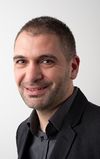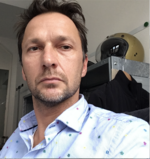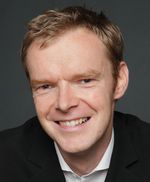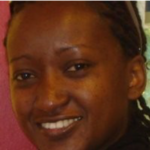Webinar on State of Play : Sustainable Energy in Humanitarian Settings
Webinar on State of Play : Sustainable Energy in Humanitarian Settings (June 2019)
Presentation
Speakers

Marco Albertini, International Committee of the Red Cross (ICRC)
With a background in Environmental Engineering and Business Administration, Marco has 15 years of international experience in team coordination and project management in the fields of water and power supply and rehabilitation of infrastructures for essential services.
He joined the ICRC in 2005 and undertook field missions coordinating humanitarian operations in Ethiopia, Pakistan, Palestine, Mauritania, Philippines, Lebanon, South Sudan. He is currently the Knowledge Manger for the ICRC Water and Habitat Unit at Geneva HQ.
Raffaella Bellanca, World Food Programme
Raffaella, Energy for Food Security coordinator at WFP, is an Access to Energy specialist focused on energy delivery models and the development of sustainable value chains that meet households, institutional, commercial and humanitarian needs for cooking, lighting, cooling and productive uses.
On the topic, she has co-authored several papers and a book. Raffaella has entered the development sector as executive director of the energy practitioners network, HEDON, publisher of the peer reviewed journal Boiling Point. She has worked in the field, Haiti and Mali, as well as in London.
Raffaella has worked in the energy sector for over twenty years, starting from simulating combustion processes in power plants (for ENEL SPA) and car engines. She experienced entrepreneurship first hand by co-founding a university spin-off clean-tech company, incubated by a technology centre in Sweden. She holds a PhD in Combustion Physics, MSc in Environmental Physics and a Master in Communication for Development.

Francois Delfosse, Doctors Without Borders / Médecins Sans Frontières (MSF) Holding a Master Degree in Geopolitics and a diploma of humanitarian applied logistic, François Delfosse has been working in the humanitarian sector for the past 21 years, including more than 11 years in the field. Currently Project manager, is developing a comprehensive and transversal Environmental Roadmap for MSF Operational Center Geneva, aiming at promoting and implementing environmental best practices, encompassing OCG environmental footprint and setting the frame to better understand the impact of climate change on populations’ needs and therefore reflect on our operational approach.

Florent Eveillé, Food and Agriculture Organization of the United Nations (FAO) Florent Eveillé coordinates the Safe Access to Fuel and Energy approach within and outside of FAO. Before ensuring this role, he worked for the FAO Office in West Bank & Gaza Strip. With a background in Natural Resources Management and Economics, Florent has covered different roles in the field of resilience, nature conservation, renewable energy and waste management in Central African Republic, France, Jordan, Lebanon and at EU level.

Thomas Fohgrub, United Nations Institute for Training and Research (UNITAR) Thomas is the head of the Coordination Unit for the Global Plan of Action for Sustainable Energy Solutions in Situations of Displacement, which is hosted at the United Nations Institute for Training and Research and is steered by 13 key organizations from humanitarian aid and development assistance. He is working within UNITAR at this topic since two years. Before that, Thomas was for more than 4 years the focal point for trade and development, economic cooperation and sustainable energy at the German Mission to the UN in Geneva and served in other capacities for the German Ministries of Energy and Social Affairs before. He holds an MA in European Studies and a PhD in Management Consulting.

Sergio Gelli, International Committee of the Red Cross (ICRC) Sergio Gelli works for the International Committee of the Red Cross- ICRC, as the Energy Initiatives Senior Advisor to the Board of Directors.Before joining the ICRC and covering roles of progressive responsibilities in the field and at Headquarters where he was until 2018 Deputy Head of the Water and Habitat Unit he worked for various organizations as Consultant in Public Health engineering in the Humanitarian Sector.
Owen Grafham, Chatham House
Owen Grafham joined Chatham House in May 2014. During his time in the Energy, Environment and Resources department, he has managed Chatham House's research and outreach on energy for displaced populations and the institute's work on energy-use inside the humanitarian system.
Owen is the author of many papers on humanitarian energy including ‘Heat, Light and Power for Refugees: Saving Lives, Reducing Costs’ and ‘The Costs of Fuelling Humanitarian Aid’. He has been on the technical advisory board for a number of related projects including an Economic and Social Research (ESRC) funded study on the energy use of refugees conducted by Edinburgh University and an ongoing EPSRC-funded project at Coventry University – ‘Humanitarian Engineering and Energy for Displacement (HEED)’.
Eva Mach, International Organization for Migration (IOM) Eva Mach works as Environmental Sustainability Programme Officer at the Headquarters of the International Organization for Migration – the UN Migration Agency (IOM). In this capacity, she manages IOM’s institutional Environmental Sustainability Programme which aims to connect environmental sustainability principles and practices with migration governance and management with a special focus on the clean energy transition and environmental management systems. She also contributes to IOM’s global policy work on water and energy related topics.

Madeleine Marara, Office of the United Nations High Commissioner for Refugees (UNHCR) Madeleine Marara, who has more than 10 years of mix-experience in the humanitarian, development and academic sectors, currently works at the Headquarters of the UN Refugee Agency (UNHCR), as an associate project officer, within the Energy and Environment Unit. Prior to joining UNHCR headquarters, she has worked in the field with UNHCR Rwanda Operation, where she developed the country SAFE (Safe Access to fuel and Energy) Strategy and managed its implementation. Her other work experience include work in the development sector, mainly in WASH, Environment and sustainable energy solutions in remote areas. Miss. Marara holds a BSc. Degree in civil engineering from KIST, Kigali - Rwanda and a MSc. degree In Environmental Sciences from IHE, Delft-The Netherlands.
Further Resources on Humanitarian Energy
Find here some useful resources for further information:
Available resources on energypedia
Global Plan of Action
- Global Plan of Action - Framework for Action
- Global Plan of Action - Unitar website
- Identification And Analysis Of Standard Clauses Of PPA And Leasing Agreements For Energy Provision In The Humanitarian Sector
- Feasibility and Applicability of a Global Guarantee Mechanism in Humanitarian Energy Contracts
- SAFE Workshop 2019 - Final Report
- Humanitarian Energy Conference 2019 - Final Report
- Renewable Electrification of Refugee Camps – Phase 1
Mercy Corps
Moving Energy Initiative
- The Costs of Fuelling Humanitarian Aid (2018)
- The Solar Energy Handbook - A guide to institutional solar for organizations working in humanitarian settings
- Private-Sector Engagement - The Key to Efficient, Effective Energy Access for Refugees. Toolkit (2016)
- Heat, Light and Power for Refugees Saving Lives, Reducing Costs (2015)
- Prices, Products and Priorities - Meeting Refugees’ Energy Needs in Burkina Faso and Kenya (2018)
Renewable Energy Transition
- McKinsey (2019): Energy Perspective 2019: Reference Case
- World Economic Forum (2019): Fostering Effective Energy Transition 2019
- World Economic Forum Website: Shaping the Future of Energy
Grantham Instittute
Blog Articles
- Rachel Kyte: https://www.seforall.org/news/on-world-humanitarian-day-its-time-we-finally-talk-about-energy-access
- Vijay Bhopal and Sandy Robinson: Is Sustainable Attainable?
Organizers



















